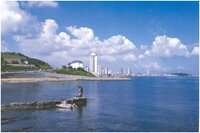|
|
|
 |
 |
| |
Yantai literally means "smoky mound". In the Ming Dynasty, locals used wolf dung to light
fires (Langyan) to warn the whole village of approaching Japanese Pirates (Wokou). The city
was nothing but a small fishing village until the late 19th century when it became a treaty
port for the British, handed over by the falling Qing Dynasty, which had been defeated in the
Opium War. Then with the Germans' power over the whole Shandong peninsula in early 20th century,
Yantai was also controlled by Germans for about 20 years. After the Americans won World War I,
they turned Yantai into a summer station for their entire Asian fleet. Then the Japanese set up
a trading establishment in the town. You may be able to get an idea of the different influences
at the western style Yantai Museum, which used to be a guild hall. However, the colourful history
has not left a distinctive architectural mark, there has never been a foreign concession, and
though you will see an occasional nineteenth-century grand European building, most of the town is
of much more recent origin. After liberation, the town's name was changed from the original, Chefoo,
to Yantai and was opened to the world as an ice-free trade port in 1984.
Many foreigners come to Yantai on the ships that call in at the big port in the north of town.
There are many Russian sailors, who stop off at the International Seamen's Club opposite the train
station. The tourist industry is based around the beaches and some say Yantai is best described as
Qingdao's poor relation. Wandering the seafront is the most pleasant way to spend any time here.
The city has two beaches, but they're often littered, windy and are hemmed in by not very attractive
buildings. Number 2 beach, the furthest, is the best, though the water is not very clean.
Yantai is the birthplace of the famous Shandong cuisine and also boasts a richness in marine products. Peanuts and various fruits are the major agricultural exports while wines and clocks are most well-known throughout the country.
|
|
Global Exchange Center | Suite C-5C, Keshi Office Building | Xin Xi Lu, Jia 28
Beijing, Haidian Shangdi, China 100085
Telephone: 86.10.8237.3308 or 86.10.8237.2368 | Fax: 86.10.8237.2368 |
Email:
Skype: <glexchange>
Global Exchange Center, 2008 - 2009. All Rights Reserved
京ICP备 05044697
|
|
|
Valuable Teaching Experiences
Multi cultural environments
Free Job Training
Both full time and part time
available |
|
The first Quarter 2009
Newsletter available now. |
| |
Chinese New Year in China |
| |
Interview with students from
Finland, Germany, UK. |
|

|
|
|